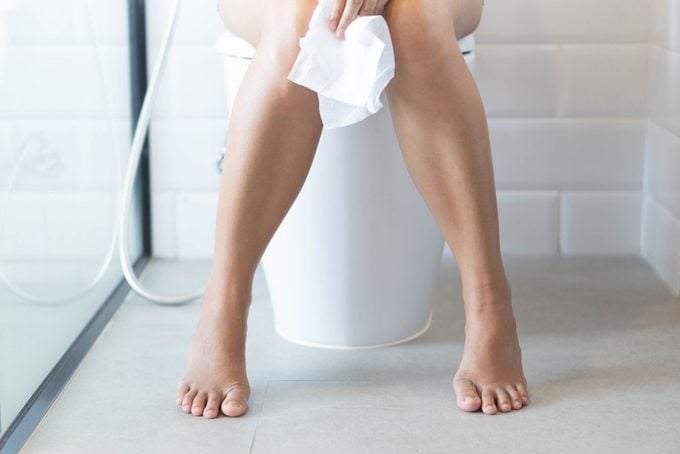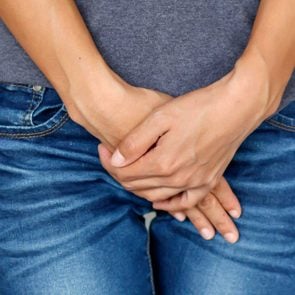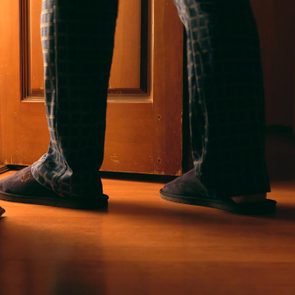Why Does It Burn When I Pee? 8 Things It Could Mean
Updated: Mar. 30, 2022
A burning sensation when you pee is a (really) distressing feeling. But painful urination can sometimes be easy to treat. Here's what to know.
Why does it burn when I pee?
When you pee, a burning, stinging sensation could signal an infection or even just irritation from food, drugs, or medication.
The sensation usually comes with other symptoms as well, which can help determine the cause (and the treatment).
“It’s pretty unusual to just have burning,” says Elizabeth Kavaler, MD, a urologist with Lenox Hill Hospital in New York City and author of A Seat on the Aisle, Please!: The Essential Guide to Urinary Tract Problems in Women. “Usually, other things go with it.”
That could be urine that’s cloudy or differs in color, odor, or frequency.
Here are the reasons why it may hurt or burn when you pee.
Urinary tract infection
“The most common problem that patients have when they talk about burning during urination is a urinary tract infection,” says Anthony Schaeffer, MD, a urologist at Northwestern Memorial Hospital in Chicago.
That’s especially true if the symptoms come on suddenly and you’re a woman. In fact, 50 percent or more of women will get a urinary tract infection or UTI at some point during their lifetime.
If you have a UTI, the burning sensation when you pee is usually accompanied with a feeling that you need to go all the time and sometimes cloudy urine.
Ninety percent of UTIs are caused by the bacterium Escherichia coli (E. coli), which can be treated with antibiotics.
Irritation and sensitivity
You may feel burning when you pee, but not have an infection. Anything that irritates your urinary tract (which includes your kidneys, bladder, ureters, and urethra) can cause these sensations.
“If the skin is raw or chafed or irritated or if the urine is acidic, then it could burn,” says Dr. Kavaler.
The list of culprits is long: acidic food like citrus fruits, drinks with alcohol or caffeine or ingredients in bubble baths, soaps, douches, contraceptive foams or sponges, and more.
The best solution is to identify and remove the offender.
(Here are 11 things you never knew about peeing.)
Bladder and kidney stones
These stones, most often formed from calcium, can grow large enough to block parts of the urinary tract. That impedes the flow of urine, which leads to stinging and burning when you pee.
Unlike UTIs, these are more common in men.
Frequent UTIs can actually lead to stones, as can not drinking enough water, being obese, and fluid loss from frequent diarrhea, which itself could come from a medical condition like Crohn’s disease.
Other symptoms can include that urgent need to go, dark or bloody urine, nausea, and vomiting, cramping in your back and side, and not actually passing much urine.
Ovarian cysts pressing on the bladder may also affect how you urinate. Take heart: Most are benign and may even go away on their own—although you should consult your doctor. (Ovarian cancer is relatively rare but make sure you don’t miss the signs.)

Vaginitis
One-third of women will develop vaginitis or inflammation of the vagina during their lifetime.
It’s caused by anything that changes the natural flora (resident bacteria and other organisms) in that area. That could be a yeast infection, intercourse, antibiotic use, fluctuating hormone levels during pregnancy or menopause, chemicals from douching, or spermicides.
(Here are some reasons your urine might smell funny.)
Sexually transmitted diseases
Although many sexually transmitted diseases (STDs) have no symptoms, some do announce themselves with urination that burns, especially gonorrhea, herpes, chlamydia, and syphilis.
“Sexually transmitted diseases can give a pain sensation and burning,” says Dr. Schaffer. “If someone is sexually active, then they should be evaluated.”
Along with UTIs, this is one of the top two causes of painful urination in women.
If you suspect you have an STD, it’s important to get it checked out by a medical professional so they can prescribe treatment.
Pelvic floor disorder
This is a muscular condition that has nothing to do with infections, says Dr. Kavaler.
The pelvic floor is a collection of muscles that support the bladder, uterus, prostate, and other organs in your pelvic area. It may be associated with interstitial cystitis (IC) or bladder pain syndrome, but no one has pinpointed exactly what causes IC.
Along with the pain, while peeing, you may also feel a frequent, urgent need to get to the bathroom.
Prostate problems
In men, the urethra, which transports urine out of the body, passes through the prostate gland. Prostatitis (inflammation) can disrupt urination.
Often it’s an infection that causes the inflammation or, in older men, it could be due to benign prostatic hyperplasia (BPH), commonly called an enlarged prostate.
You may also experience having to pee often (at least eight times in a 24-hour period), urgency, or needing to pee at night.
Medication
Some drugs can cause painful urination, namely chemotherapy and radiation treatments for cancer. Surgery in the urinary tract and pelvic areas can also contribute.
The most common chemotherapy drugs to damage the bladder are cyclophosphamide (Procytox) and ifosfamide (Ifex). They can also up the risk for UTIs.
If you have side effects from cancer treatment, the National Cancer Institute recommends drinking a lot of water and keeping in touch with your oncologist on ways to prevent symptoms.
When to see a doctor
For some people, painful urination goes away on its own, while others have success with home remedies like drinking cranberry juice (for UTIs) or avoiding bubble baths. Often the pain is so distressful you’ll head to the doctor.
If the symptom doesn’t go away and if you have bloody urine, any changes in the color or odor of your urine, a fever, or pain in your back and side, see a doctor. Also, seek help if you’re pregnant or have an immune condition.
“A doctor will put all the information together and look at treatments,” says Dr. Kavaler.






















